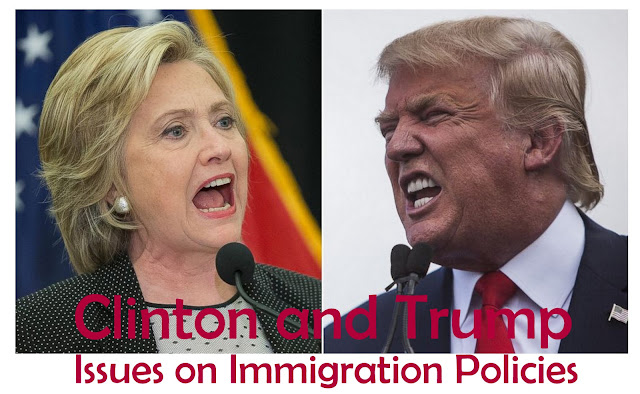Positions on Immigration: Donald Trump and Hillary stand on immigration
Immigration Policies
Positions on Immigration: Donald Trump and Hillary stand on immigration
Presidential Debate
by Jorge Yeshayahu Gonzales Lara -
La Diaspora Latino Digital Magazine
The political gap between the
presidential candidates, Hillary Clinton and Donald Trump is unprecedented, especially
when it comes to one of the most controversial issues in this election cycle
reform of US immigration. The issue of immigration policies affect the entire
nation.
Donald Trump
has been determined from the border wall and potentially in the deportation of
undocumented immigrants. While Clinton has pledged to protect the families of
undocumented immigrants from deportation and promote comprehensive immigration
reform. The issue is the economic cost and the impact on the national economy.
From a sociological approach of
the central issues on immigration reform - specifically on border security,
deportation, refugee resettlement, detention, paths to citizenship permits,
visas, and work. These issues are dividing the nation. Latinos who were once immigrants now seeking to distance themselves from new immigrants but also of the 11 million undocumented immigrants. This political and social fact is repeated in the history of migration in the United States. Older immigrants are faced with hatred against new waves of migration. Donald Trump's endorsement reflects a number of unfinished frustrations and fears. It is evident that the nation has started a revolution against the old political policies.
The proposed Donald Trump - the
construction of a wall along the border between the US and Mexico - including
claims that Mexico will pay for the wall, which could cost between $ 5 billion
to $ 10 billion.
"I
will build a great wall on our southern border, and Mexico will pay for that
wall" Trump first part of the public, said in announcing his
presidential candidacy in June 2015 and said that in almost every campaign
event. In addition, Trump also proposes to increase rates on visas, tariffs and
border crossing cards - a major cause of overstays.
Clinton proposes the protection
of borders and national security and supported the immigration bill in the
Senate that would have funded a 2013 enhanced border security plan, including
additional border fence.
But it is evident that the
borders are not secure, and has increased human trafficking of immigrants and
minors recently. The nation faces stiffly 11 million people who live and work
in the United States. Contrary to this Trump promotes the deportation of 11
million undocumented workers and create a "force eject" and impose
criminal penalties on immigrants and drug traffickers. Trump proposes to triple
the number of agents of Immigration and Customs Enforcement (ICE) from 5,000 to
15,000. Trump also wants ICE officials to cooperate with local law enforcement
raids on gangs, specifically the undocumented immigrants who are believed to
have gang connections. Trump wants to end birth right citizenship - which
states that "the biggest magnet for illegal immigration" - the
suspension of the policy automatically gives the children of undocumented
parents born in the United States citizenship. Clinton also said it would
expand outreach efforts for people seeking US citizenship, partly for
mitigation of language and economic barriers that make it difficult for undocumented
immigrants navigate the process. Clinton supports DACA and DAPA programs that
allow qualified undocumented immigrants to obtain work permits. What none of
the candidates has been mentioned H-1B visa?
To conclude Trump postures and
Clinton will not have any negative aspect in wages and jobs of US citizens in
the short term, but a positive aspect in highly skilled in innovation and job
creation immigrants. In the international market economic treaties may be
affected by immigration policy, especially labor of immigrants and unskilled
temporary workers, the area of agriculture and services.




